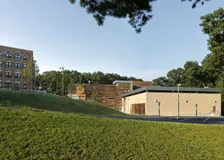Outpatient Child/Adolescent Psychiatry
The major task of this assignment is for the resident to gain proficiency in diagnosing and treating a variety of children and adolescents with a wide range of psychiatric disorders. CAP fellows rotate through various outpatient clinics at Tufts Medical Center. During the clinics fellows conduct patient intakes with interviewing, developing differential diagnosis and formulation, and continuing in longitudinal management of the case as part of the fellows’ growing outpatient panel. Fellows are assigned two supervisors for weekly supervision. The outpatient clinics are as follows:
- ADHD Clinic
- Mood and Anxiety Disorder Clinic
- Developmental Trauma Clinic
- General Psychopharmacology Clinic
- Integrated Behavioral Health Clinic with General Pediatrics
Tufts Medicine Pediatrics
Tufts Medicine Pediatrics at Tufts Medical Center is located in downtown Boston and has many partnerships within the community.
- GME education at Tufts and Tufts Medical Center
- Tufts Medical Center - Touched My Heart
- Tufts Medical Center - Strength is Contagious
CAP Fellowship Rotations at Tufts Medical Center
The CCSN works with infants, children and adolescents who have developmental, behavioral or emotional issues that interfere with growth and/or functioning. CAP fellows rotate with the CCSN for a half day per week during the first year of fellowship, and gain experience working with children with developmental delay and autism spectrum disorder. Fellows work with the CCSN’s team of Developmental-Behavioral Pediatricians, Psychologists, Education Specialists and Neurologists to evaluate and work with patients and families served by the CCSN, and receive group supervision.
Fellows may also attend Autism Behavioral Clinic (ABC) Clinic where they can observe a team and family approach for autistic children. This clinic uses a consultation model to make recommendations for families where their autistic child presentation has been refractory to treatment. Fellows only observe this clinic and do not have expectation of carrying out the treatment.
Outpatient Consultation Service
Due to the shortage of Child Psychiatrists, the psychiatrists are often in the position to provide consultations to the their pediatric colleagues. This clinic was developed to increase experience of outpatient and emergency room consultation and increase access to care for patients. Fellows will evaluate children and adolescents who have been referred by the pediatrician through Massachusetts Child Psychiatry Access Program, Tufts Medicine Pediatric Emergency Room and Peds Psychopharmacological Clinic. In the Psychopharmacological Clinic, the fellows will provide longitudinal consultation for 3-9 months depending on the needs of the patient. In addition to the initial evaluation, the fellows will prepare a treatment plan for the pediatric colleagues to follow through with.
Cambridge Health Alliance
This three-month inpatient child psychiatry rotation is completed during the first year of fellowship at Cambridge Hospital Child Assessment Unit (CAU) and Adolescent Assessment Unit (AAU). The major goals of this rotation are to gain experience and knowledge in assessment, diagnosis, formulation and treatment planning for children and adolescents requiring hospital level of care, and work with a multidisciplinary team. The clinical management in the hospital milieu will include individual, group, family work and pharmacological treatment. The education during this rotation is enhanced with weekly interviewing seminars with seasoned faculty.
St. Ann’s Home & School

1st year Child and Adolescent Psychiatry Residents will spend three months at the St. Ann’s Home in Methuen, MA. They will provide care on the Community Based Acute Treatment (CBAT) and Transitional Care Unit (TCU). Children between the ages of 5-12 years receive 24 hour care in this unit and are admitted there with significant emotional and behavioral problems and commonly with developmental trauma, and who require continuous care but are not at acute imminent risk of harm. Diagnoses are similar to those seen on an inpatient unit but also include children with significant learning difficulties and academic problems in school. Children generally are in this program for 2-4 weeks. Residents will be responsible for admission, rounds, treatment team meetings, family meetings, discharge planning and collaboration with schools. Residents will also coordinate milieu treatment and organize team based collaboration. Residents will be supervised by two Board Certified Child and Adolescent Psychiatrists at St. Ann’s Home with at least 2 hours of supervision weekly. Competencies to be gained are similar to those gained on the inpatient rotation but also include organizing the milieu treatment and coordinating discharge planning.
Lowell Juvenile Court Clinic

The major objective is to learn techniques for providing effective child/adolescent psychiatric consultation within a court clinic setting, including the provision of psychiatric testimony. This consultation is provided at the Lowell Juvenile Court Clinic. The resident is able to do the following:
- Review the problem with the hospital attorneys, referring judge, other attorneys, guardian Ad Litem or probation officer
- Obtain pertinent information from legal documents, e.g. briefs, arrest warrants, prior court testimony and police reports
- Learn to psychiatrically evaluate and diagnose children/adolescents who are adjudicated to the court
- Learn about the specific legal aspects regarding child/adolescent psychiatry, e.g. Child Abuse Petitions, Adjudicating a Child as an Adult, termination of Parental Rights, Commitment, Custody (physical and legal), Incarceration, Legal Rights, Tarasoff Issues and Miranda Law
- Recognize symptoms and syndromes of a variety of disorders commonly seen in court clinic consultations including Conduct Disorder, Antisocial Personality Disorder, Substance Abuse, Organic Brain Disorders, Psychosis, Borderline Personality Disorders, Bipolar Disorder, Major Depressive Disorders, Temporal Lobe Syndrome, Sequelae of Head Trauma and ADHD
- Understand the court committed child/adolescent regarding involvement of family, community and schools
- Understand the role, demands, expectations and environment of the court and its staff
- Learn to provide accurate, concise, jargon-free psychiatric testimony
- Learn how a courtroom functions in terms of rules of order, hierarchy, type of legal proceedings and hearings, e.g. Civil, Probate, Criminal and Federal
Community Psychiatry: Boston STARR program (Stabilization, Assessment & Rapid Reintegration)
This rotation provides experience in community psychiatry in a consultation role to the Boston STARR Program, a short-term residential program with the Department of Children & Families. Residents at the Boston STARR program are youth, and commonly struggle with issues of domestic violence, community violence, ADHD, trauma and mood disorders. Fellows act as consultants to the STARR program and conduct assessments of individual youth and provide recommendations.
School Consultation: Josiah Quincy Elementary School and Newton Public Schools
The major objective is to learn the techniques for effective psychiatric consultation at the request of teachers, principals, guidance counselors and special education personnel. Within the school, residents are able to gain experience in the following:
- Reviewing problems with the referring special education personnel, administration and teachers who know the child
- Recognizing those disorders encountered in a school setting such as Learning and Language Disorders, PDD, Major Depressive Disorders, ADHD, Eating Disorders, Organic Brain Disorders, intellectual disabilities and Bipolar Disorders
- Becoming familiar with problems often encountered in the school-aged population (e.g. school absence, school phobia/avoidance and disruptive behavior)
- Understanding the role of the family, teachers, principal and special education staff within the school milieu
- Providing verbal and written reports to the school staff while maintaining appropriate confidentiality